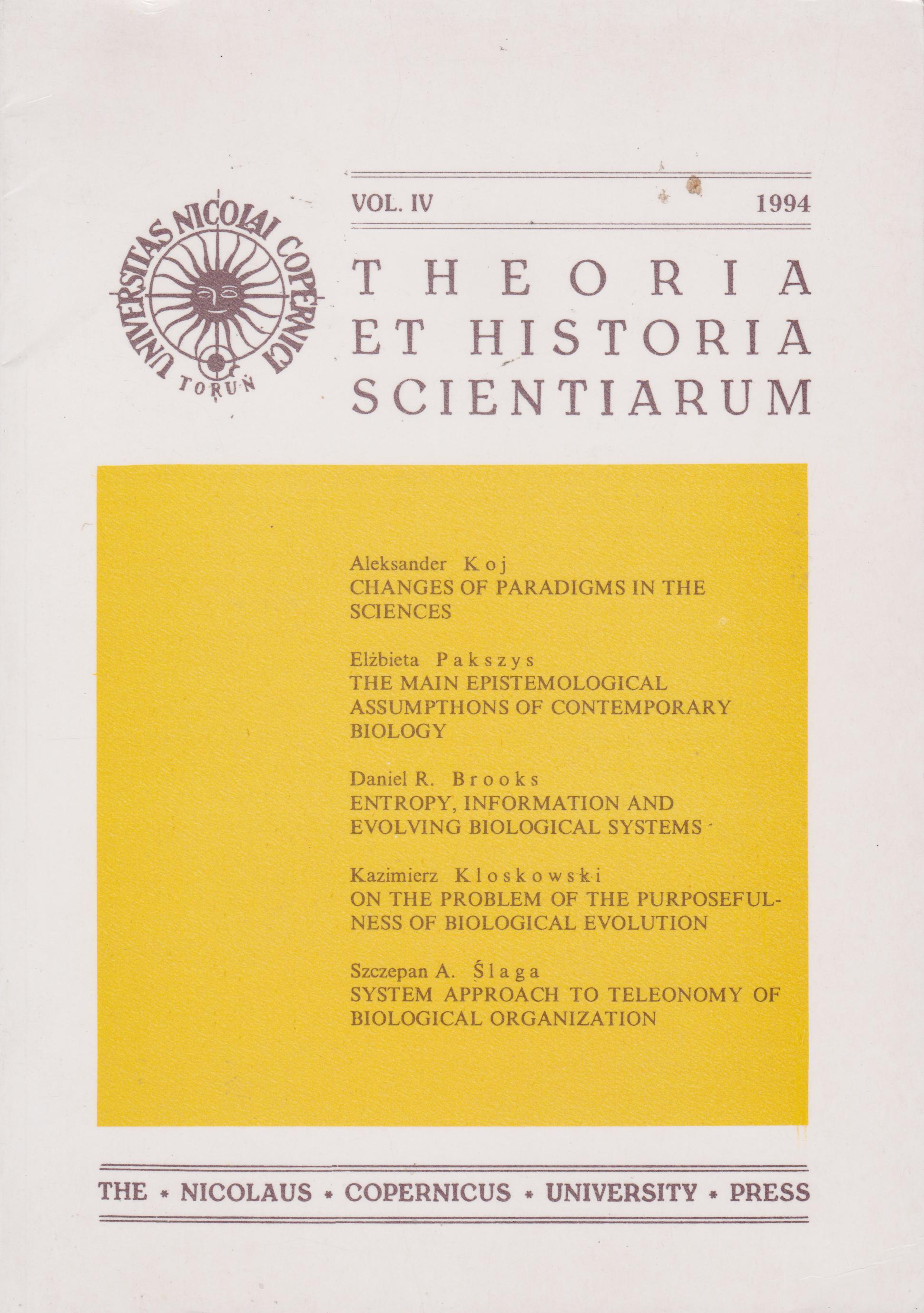On The Problems of the Purposefulness of Biological Evolution
DOI:
https://doi.org/10.12775/ths.1994.005Keywords
biological evolution, adaptiveness, teleological explanation problemAbstract
E. Schrodinger characterized the twentith century as an age of evolution. One needn’t to prove the obviousness because the gradual and continuous process of changes is the distinctive feature of the origin and the growth of the universe, life and man. Although it is difficult to answer in an adequate way the question of the nature of that process. Especially when we rafer to the biological evolution which not only the biologists but philosophers as well make their attempts to explain. And both parties face some typical difficulties and liminations. The biologists cencentrate on the „discovery” of the essence of the physical and chemical changes leading to the synthesis of the macromolecules, developing the sets of macromolecules into a mother cell and the growth of the mother cell into a man. In this way the biologists try to find the principles explaining these phenomenous.References
Ayala F. J., The Autonomy of Biology as a Natural Science, in: Biology, History and Natural Philosophy, ed. by A.D. Dreck, W. Yourgrau, New York 1972, 1-16.
Ayala F.J., Biology as an Autonomous Science, „Boston Studies in the Philosophy of Science” 27 (1976) 313-329.
Ayala F.J., Teleological Explanations in Evolutionary Biology, „Philosophy of Science” 37 (1970) no. 1, 1-15.
Beckner M., The Biological Way of Thought, New York 1959.
Beckner M., Function and Teleology, „Journal of the History of Biology” 2 (1969) no. 1,151-164.
Brandon R. N., Biological Teleology: Questions and Explanations, „Studies in History and Philosophy of Science” 12 (1981) no. 2, 91-105.
Burian R. A., The Influence of the Evolutionary Paradigms, in: Evolutionary Biology at the Crossroads. A Symposium at Queens College, ed. by M.K. Hecht, Flushing, New York 1989, 149-166.
Canfield J., Teleological Explanation in Biology, „The British Journal for the Philosophy of Science” 14 (1964) no. 56, 285-295.
Collins A. W., Teleological reasoning, „The Journal of Philosophy 75 (1978) no. 10, 540-550. Duchesneau F.,Teleologie et determination positive de l’ordre biologique, „Dialectica” 32 (1978) no. 2, 136-144.
Engels E. M., Die Teleologie das Lebendigen, Berlin 1982.
Fisher R. A., Indeterminism and Natural Selection, „Philosophy of Science” 1 (1934) no. 1, 99-117. Goldstein L.J., Recurrent Structures and Teleology, „Inquiry” 5 (1962) 1-12.
Gruner R., Teleological and Functional Explanations, „Mind” 75 (1966) no. 300, 516-526. Harris E. E., Teleology and Teleological Axplanation, „The Journal Philosophy” 56 (1959) 5-25.
Kloskowski K., Stochastyczność procesu ewolucyjnego, „Miesięcznik Diecezjalny Gdański”
XXXIII (1989) z. 10-12, 230-235, (Stochasticness of the evolutionary process).
Kloskowski D., Zagadnienie determinizmu ewolucyjnego. Studium biofilozoficzne, Gdańsk 1990, (Problem of the evolutionary determinism. The biophilosophy studium).
Kunicki-Goldfinger W.J.H., Ewolucjonizm i jego odbicie w światopoglądzie, „Roczniki Filozo¬ficzne” XXXI (1983) z. 3, 9-20, (Evolutionism and its reflections in outlook of life).
Kunicki-Goldfinger W. J. H., Przedmowa, [do:] T. Ścibor-Rylska, Tajemnice uorganizowania żywej komórki, Warszawa 1986, 13-24, (Preface, [to:] T. Ścibor-Rylska, The mysteries of organizing of the living cell).
Kunicki-Goldfinger W. J. H., Szukanie możliwości. Ewolucja jako gra przypadków i ograniczeń, Warszawa 1989, (Searching for possibilities. Evolution as play of chances and limitations).
Mayr E., Evolution and the Diversity of Life, Cambridge-Massachusetts-London 1979 3.
Mayr E., Teleological and Teleonomic. A New Analysis, „Boston Studies in the Philosophy
of Science” 14 (1974) 91-118.
Minton A. J., Wright and Taylor: Empiricist Teleology, „Philosophy of Science” 42 (1975) 299-306. Nagel E., The Structure of Science. Problems in the Logic of Scientific Explanation, London 19705. Nagel E., Teleology revisited, „The Journal of Philosophy” 74 (1977) no. 5, 264-276.
Nikitin E., Wyjaśnianie jako funkcja nauki, tłum. S. Jędrzejewski, Z. Siombierowicz, Warszawa
, (Explanations as the function of science).
Nissen L., Nagel’s Selfregulation Analysis of Teleology, „The Philosophical Forum” 12 (1980-81) no. 2,128-138.
Purton A. C., Biological function, „The Philosophical Quarterly” 29 (1979) no. 114, 10-24.
Roe A., Simpson G.G. (eds by), Behaviour and Evolution, New Haven 1958.
Simpson G.G., The Meaning of Evolution. A Study of History of Life and of its Significance
for Man, New Haven I9601.
Simpson G.G., The Problem of Plan and Purpose in Nature, „The Scientific Monthly” 64 (1947) no. 6, 481-495.
Szarski H., Mechanizmy ewolucji, Warszawa 1986 ’, (Mechanisms of evolution).
Ślaga W., Życie - ewolucja, w: M. Heller, M. Lubański, Sz. W. Ślaga, Zagadnienia filozoficzne współczesnej nauki. Wstęp do filozofii przyrody, Warszawa 1980,297-423, (Life - evolution, in: M. Heller, M. Lubański, Sz. W. Ślaga, Philosophical problems of the modern science. Introduction to the philosophy of nature).
Tax Sol (ed. by), Evolution after Darwin, vol. III. Issues in evolution, Charles Callender, Chicago-London 1960.
Uts S., On Teleology and Organisms, „Philosophy of Ścince” 44 (1977) 313-320.
Wright L., Explanation and Teleology, „Philosophy of Science” 39 (1972) no. 2, 204-218. Wuketits F.M., Wissenschaftstheoretische Probleme der modernen Biologie. Dunckner and Humbolt, Berlin 1978.
Downloads
Published
How to Cite
Issue
Section
Stats
Number of views and downloads: 217
Number of citations: 0



